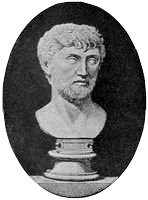De la naturaleza de las cosas
Original: ... Cur non ut plenus vitae conviva recedis? Aequo animoque capis securam, stulte, quietem?...
Variante: «¿... Por qué no te retires, como el convidado saciado del banquete de la vida, y con mente tranquila, abraces, necio, un descanso tranquilo?».
Fuente: [Doval Huecas], Gregorio. El pequeño libro de las grandes citas de humor (cita 84). Editorial Grupo Planeta, 2016. ISBN 9788416253982. https://books.google.es/books?id=9wHCDAAAQBAJ&pg=PT22&dq=%22%C2%BFPor+qu%C3%A9+no+salir+de+esta+vida+como+sale+de+un+banquete+el+convidado+harto?%22+doval&hl=es&sa=X&ved=0ahUKEwiVncSEkbzkAhVBzYUKHWASC6AQ6AEIKzAA#v=onepage&q=%22%C2%BFPor%20qu%C3%A9%20no%20salir%20de%20esta%20vida%20como%20sale%20de%20un%20banquete%20el%20convidado%20harto%3F%22%20doval&f=false En Google Books. Consultado el 6 de septiembre de 2019.
Fuente: De Rerum Natura 3,931-939. Citado por Quevedo.
Fuente: [Moya del Baño], Francisca. Quevedo y sus ediciones de textos clásicos: Las citas grecolatinas y la biblioteca clásica de Quevedo, p. 144. Ediciones de la Universidad de Murcia (Editum), 2014. ISBN 8416038678, 9788416038671. https://books.google.es/books?id=0s0uDgAAQBAJ&pg=PA144&lpg=PA144&dq=%22Cur+non+ut+plenus+vitae+conviva+recedis+aequo+animoque+capis+securam,+stulte,+quietem?%22&source=bl&ots=PId5Su9FA7&sig=ACfU3U0hXbjbYOKPONep1ivicKLJ5a5VRw&hl=es&sa=X&ved=2ahUKEwjCrIa87rvkAhUP4BoKHU0XDZQQ6AEwA3oECAcQAQ#v=onepage&q=%22Cur%20non%20ut%20plenus%20vitae%20conviva%20recedis%20aequo%20animoque%20capis%20securam%2C%20stulte%2C%20quietem%3F%22&f=false En Google Books. Consultado el 6 de septiembre de 2019.
